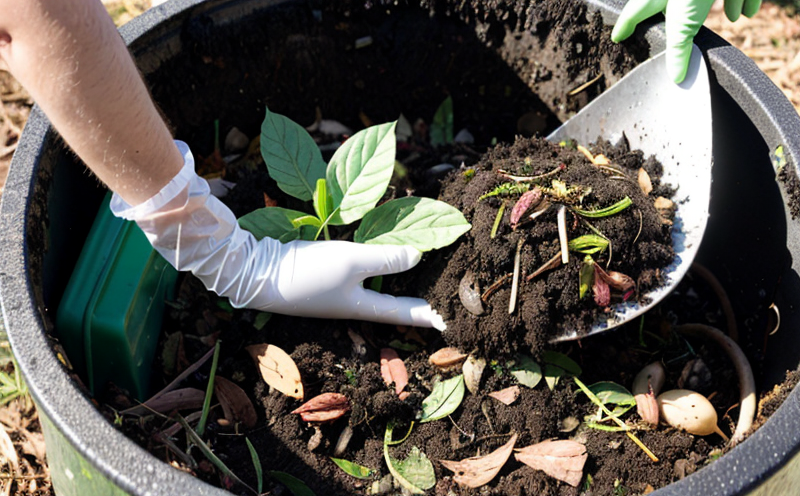ISO 14240 Soil and Compost Microbial Biomass Carbon Testing
The ISO 14240 standard provides a robust framework for assessing the microbial biomass carbon (MBC) content in soils and composts. MBC is an essential parameter that reflects the living microbial population within these substrates, which plays a crucial role in nutrient cycling and soil health. Understanding MBC levels helps stakeholders ensure compliance with environmental regulations and support sustainable waste management practices.
Compost and soil are complex ecosystems where microorganisms break down organic matter into simpler compounds. The measurement of MBC is important for several reasons:
- To monitor the effectiveness of composting processes in achieving desired microbial activity levels
- To ensure compliance with regulatory standards that mandate minimum or maximum allowable MBC content
- To support research and development efforts aimed at improving compost quality and soil health
- To verify that materials meet specific carbon content requirements for use in agriculture, landscaping, or waste-to-resource applications.
The testing procedure involves the extraction of carbon from microorganisms using a standardized liquid medium. This extracted carbon is then quantified to determine the MBC level. The test is conducted under controlled conditions to ensure accurate and reproducible results. Compliance with ISO 14240 ensures that the results are internationally recognized and comparable.
Understanding MBC levels in composts and soils can have a significant impact on various sectors, including agriculture, horticulture, and waste management. By accurately assessing microbial biomass carbon content, stakeholders can optimize their processes to enhance productivity and sustainability. For instance, higher MBC values indicate more active microorganisms capable of decomposing organic matter efficiently.
Composting is an essential part of waste management strategies worldwide. It converts organic waste into a valuable soil amendment that improves soil structure, nutrient availability, and overall fertility. The quality of compost produced through this process can be significantly influenced by the microbial activity within it. By ensuring adequate MBC levels, compost producers can create products that are more effective at improving soil health.
In addition to its role in waste management, MBC testing is also important for agricultural applications. Soil microbes play a critical role in nutrient cycling and plant growth. By maintaining optimal MBC levels, farmers can enhance the efficiency of their farming practices. This not only leads to higher crop yields but also contributes to more sustainable agricultural systems.
ISO 14240 testing is particularly important for those involved in R&D. The standard provides a consistent method for assessing microbial biomass carbon content across different materials and conditions. This consistency allows researchers to compare results from various studies, facilitating the development of new composting methods and soil treatments. For quality managers and compliance officers, ISO 14240 testing ensures that their products meet regulatory requirements, thereby avoiding potential legal issues.
The testing process is designed to be rigorous and precise, ensuring accurate measurement of MBC content. This involves multiple steps, including sample preparation, extraction using a standardized medium, and quantification using analytical techniques such as gas chromatography or infrared spectroscopy. Each step requires careful attention to minimize errors and ensure reliable results.
By adhering to ISO 14240 standards, stakeholders in the waste management and compost industry can demonstrate their commitment to sustainability and quality control. This not only enhances their reputation but also helps them meet growing consumer demand for eco-friendly products and services.
Why It Matters
The importance of accurate MBC testing cannot be overstated, especially in the context of waste management and composting. The microbial biomass carbon content is a key indicator of the health and vitality of soils and composts. By ensuring that these substrates contain adequate levels of living microorganisms, stakeholders can support sustainable waste management practices and enhance soil fertility.
In waste management, the ability to accurately assess MBC levels helps facilities comply with environmental regulations. Many regions have established standards for the minimum or maximum allowable MBC content in composts used as soil amendments. Testing according to ISO 14240 ensures that these materials meet regulatory requirements and can be safely applied without causing harm.
For agricultural applications, maintaining optimal MBC levels is crucial for maximizing crop yields and improving soil health. Microbes play a vital role in nutrient cycling, breaking down organic matter into simpler compounds that plants can absorb. By ensuring that composts contain sufficient microbial biomass carbon, farmers can enhance their farming practices and contribute to more sustainable agricultural systems.
The testing process itself is designed to be rigorous and precise. This involves careful sample preparation, extraction using a standardized medium, and quantification using advanced analytical techniques such as gas chromatography or infrared spectroscopy. Each step requires meticulous attention to detail to ensure accurate results.
Accurate MBC testing also plays a role in research and development efforts aimed at improving compost quality. By consistently measuring microbial biomass carbon content across different materials and conditions, researchers can compare results from various studies, facilitating the development of new composting methods and soil treatments.
The importance of ISO 14240 testing extends beyond compliance with regulations. It allows stakeholders to demonstrate their commitment to sustainability and quality control. By adhering to these standards, facilities in the waste management and compost industry can enhance their reputation and meet growing consumer demand for eco-friendly products and services.
Benefits
- Regulatory Compliance: Ensures adherence to environmental regulations regarding MBC content in composts.
- Sustainable Practices: Supports sustainable waste management strategies by monitoring microbial activity levels.
- Farm Efficiency: Enhances farming practices through improved soil health and increased crop yields.
- Data Integrity: Provides consistent, accurate data for research and development efforts in composting.
- Consumer Confidence: Demonstrates a commitment to quality control, enhancing the reputation of facilities.
- Environmental Impact: Minimizes potential negative environmental impacts by ensuring safe application of composts.





